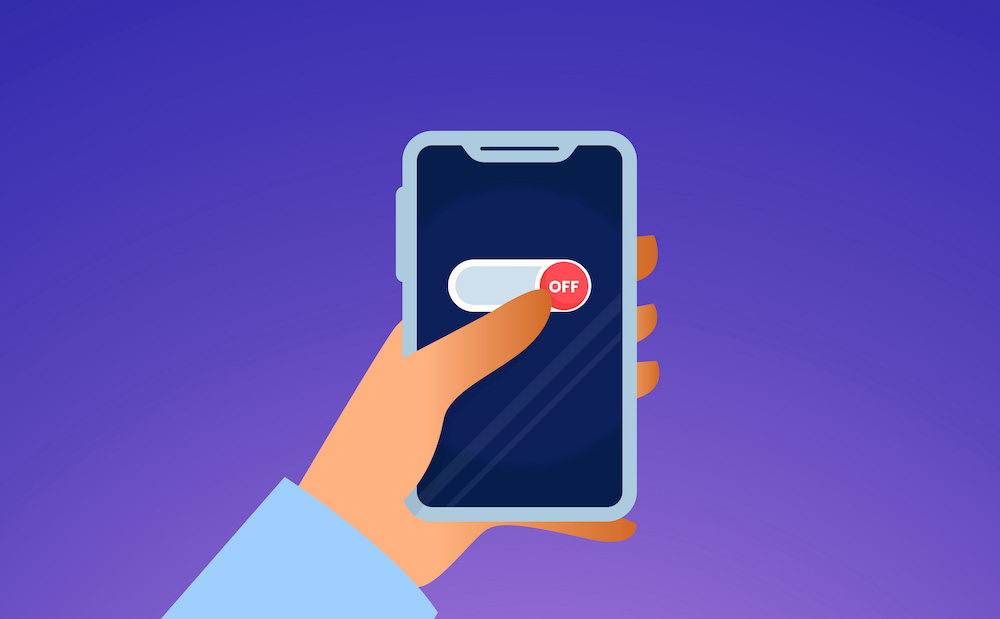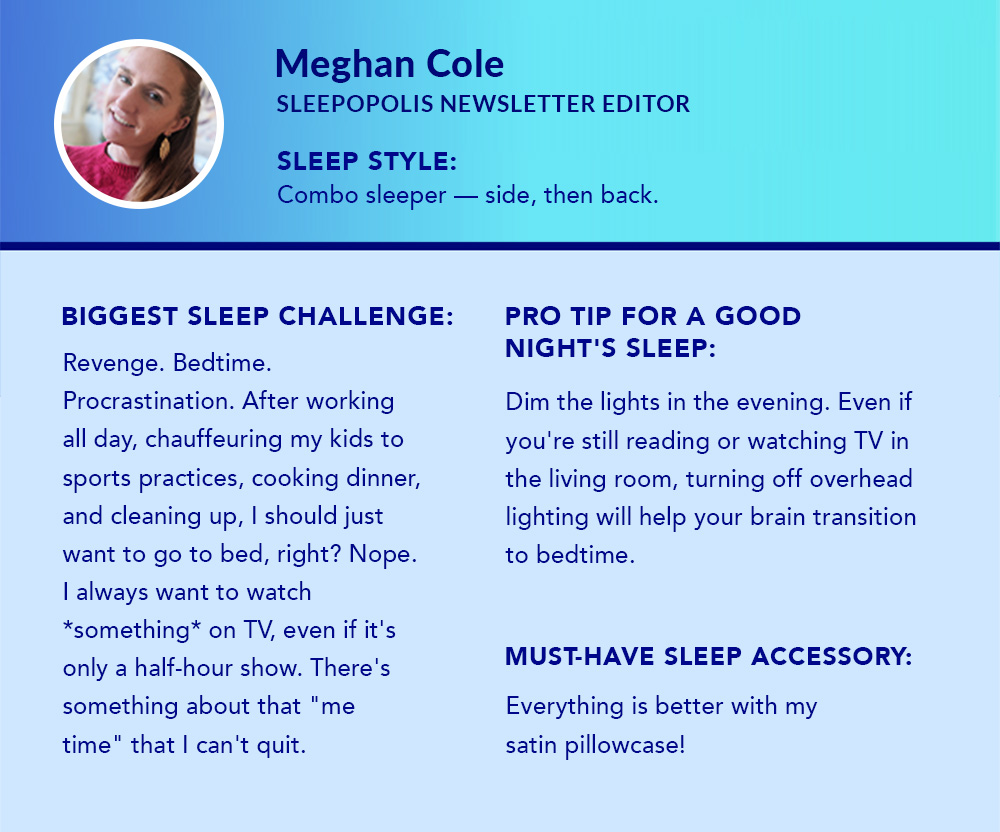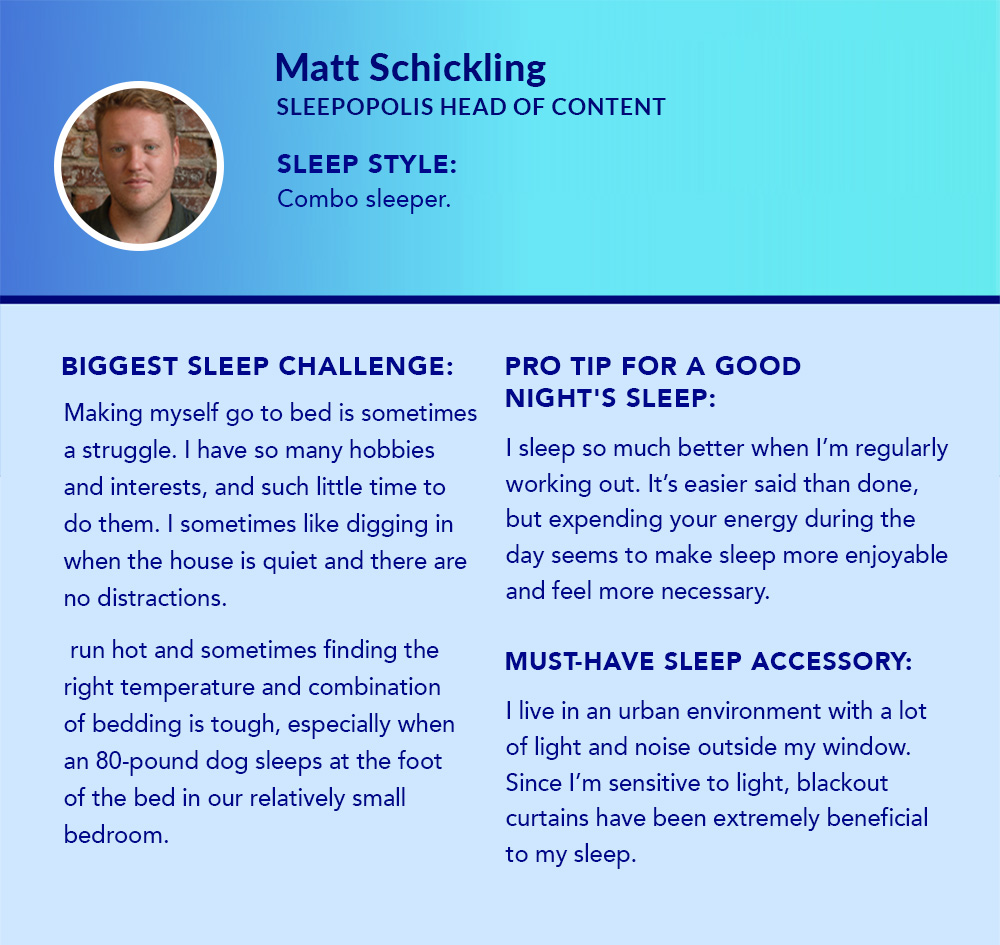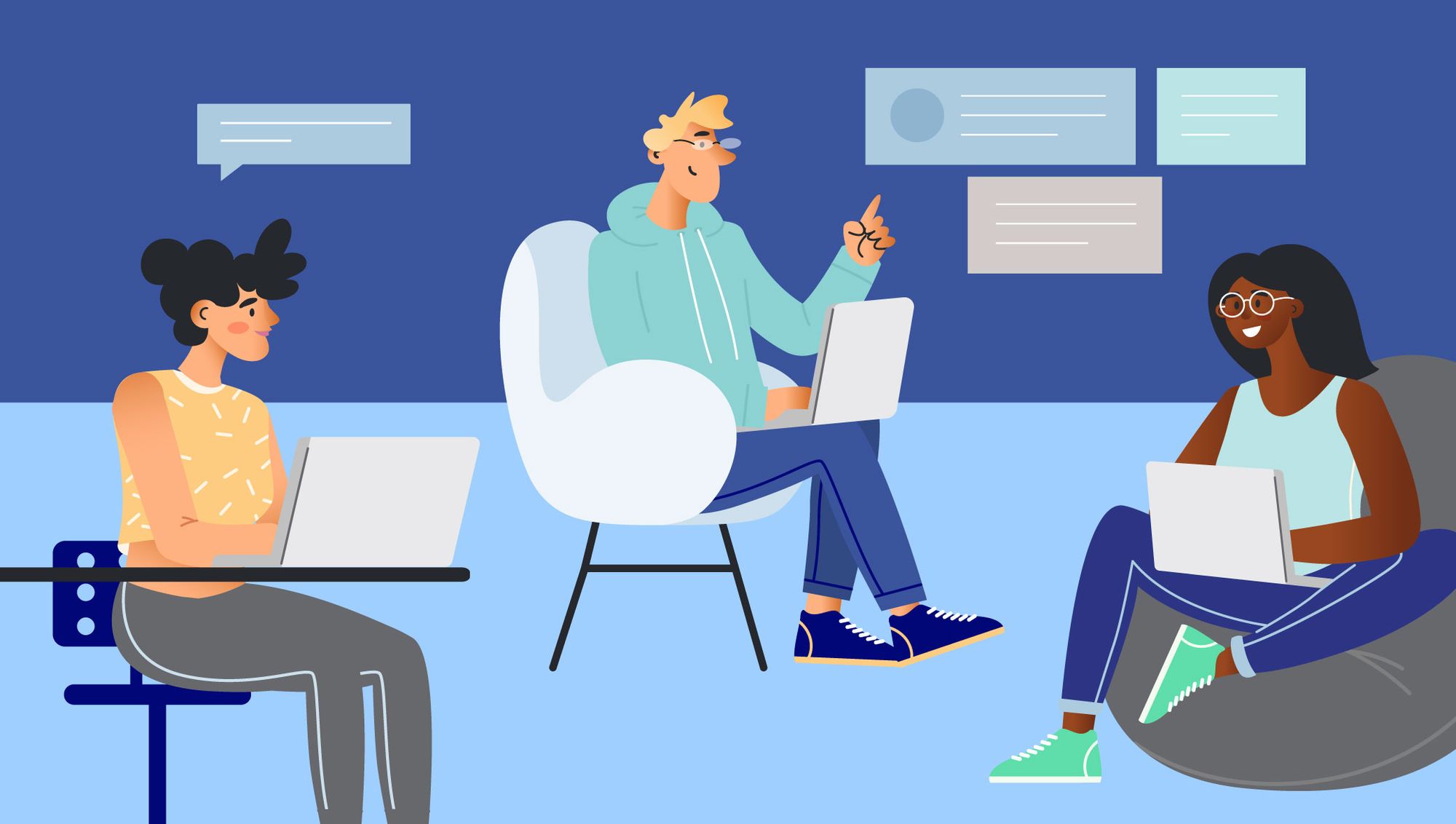
Raise your hand if you remember when users needed a college-issued email address to join Facebook. Yep, it happened — I was there. I’m an elder millennial who proudly recalls my cellphone-free years, yet also wonders how we survived without Googling every ailment.
I limit my kids’ screen time and never let them use their tablets before bedtime (the mom who writes for a sleep website knows that kids’ screen time and sleep don’t mix!). But it’s a “do as I say, not as I do” situation, as I’m part of the 65 percent of millennials who use social media many or most nights before bed.
A certified pediatric and adult sleep consultant, Annie Schlecht, MOTR/L, CIMI, tells Sleepopolis there are a few reasons why we may gravitate toward social media before bedtime. “With endless scrolls and notifications designed to captivate attention, it’s easy to get caught in a digital vortex, losing track of time and neglecting the body’s natural signals for rest,” Schlecht says.
But just because it can happen doesn’t mean it should, and I started to wonder if I should listen to my own advice and skip social media before bed. Could it help my sleep? Here’s what I learned.
Note: The content on Sleepopolis is meant to be informative in nature, but it shouldn’t be taken as medical advice, and it shouldn’t take the place of medical advice and supervision from a trained professional. If you feel you may be suffering from any sleep disorder or medical condition, please see your healthcare provider immediately.
Long Story Short
- A recent Sleepopolis survey found that 48 percent of millennials say social media or other technology keeps them awake.
- Quitting social media use before bed can help reduce blue light exposure and improve sleep quality.
- Experts suggest listening to calming music, enjoying a warm bath, or reading a book before bedtime instead of scrolling through social media.
The Impact of Social Media and Sleep
A 2024 survey by Sleepopolis found that screens keep American adults awake for an average of 2.42 nights per week, and 50 percent of surveyed millennials say they struggle to fall asleep and stay asleep most of the time.
“For millennials, who are often juggling multiple responsibilities and experiencing high levels of stress, these platforms may provide a sense of belonging and distraction from daily pressures,” Schlecht says.
As a mom of three, a full-time editor, a part-time kids’ sports practice chauffeur, and a wife, I can assure you that social media platforms provide me with a distraction from my daily stresses. A whopping 66 percent of millennials we surveyed said that their stress increased in the past 10 years. Will a few funny dog videos throughout your day make all of your problems disappear? No. Might it brighten your day a little? Yes.
But “the allure of social media comes with a price: sleep deprivation,” Schlecht adds, and our survey supports that statement: 48 percent of surveyed millennials say social media or other technology keeps them up. And when you combine the potentially addictive nature of social media platforms with the blue light from cellphones, it’s a perfect storm.
“The blue light emitted by screens suppresses the production of melatonin, the hormone responsible for regulating sleep-wake cycles, leading to difficulty falling asleep and staying asleep,” Schlecht says. Studies have also shown that social media can have detrimental effects on a person’s mental health and increase stress, neither of which is beneficial to sleep. (1) (2)
Tips for Cutting Down on Screen Time
Schlecht recommends that millennials take small steps to prioritize their rest over their screen time.
Set boundaries. Screen curfews are an easy way to cut down on your social media use before bed. “I recommend turning off all screens at least one hour before bed — two hours if you are someone who struggles to get quality sleep,” Schlecht says.
And avoid screens in the bedroom, if possible. “I strongly recommend that any screen time use takes place outside of the bedroom. And keep the bed for sleep and sex only so your brain does not learn to associate other activities with the bed, making it harder to fall asleep,” Schlecht adds.
Find alternative activities. Instead of mindlessly scrolling, find alternative activities to promote relaxation. Schlecht suggests listening to calming music, or trying a 432 Hz playlist, which some small studies suggest may help with relaxation and sleep. (3) (4)
She also says that running a warm bath is helpful for a couple of reasons: “First, the water provides weightless pressure (proprioceptive input) to the body, which has the same calming effect on the nervous system as a weighted blanket. Second, the core body temperature rises in the bath, and then naturally falls when you get out. The decrease in core temperature facilitates the release of natural melatonin within our bodies.”
You might also give other relaxing, screen-free activities a try, like reading a book, yoga, or meditating.
Revamp your bedtime routine. “Establishing a consistent bedtime routine can help cue the body for sleep. Engage all the senses during your bedtime routine with the help of calming playlists, scented candles/oils, candlelight ambiance, and bodywork,” Schlecht says.
So does skipping social media before bed really help with sleep? My colleague and I both gave it a whirl — read on to find out how it impacted our sleep.
I Tried It: Skipping Social Media Before Bed – Meghan’s Take

In the earliest days of parenthood, my husband and I would go straight to bed when the babies went to sleep; we never knew how many times we’d be up in the middle of the night. Once we all started sleeping through the night, though, my husband and I changed our bedtime routine a bit to include some grown-up TV time after the kids went to bed. Revenge bedtime procrastination? Perhaps a little. We never stay up really late — we’ve always been bed-by-10 people. But there is something about that hour of downtime between parenting and sleeping that makes me want to veg, and in recent years my TV time morphed to my TV-and-social media time. What can be better than one screen? Two! (No, kids, not really.)
I’ve never had a lot of trouble sleeping per se, but falling asleep is a different story. And I had to question whether blue light exposure was the culprit. Here I was, watching TV and scrolling social media on my phone during every commercial break after the kids went to bed. I realized that couldn’t be helping my situation.
Knowing I probably wouldn’t have the desire (perhaps willpower?) to completely cut out social before bed, I looked for assistance: I located the digital wellbeing controls on my phone and paused the apps and notifications that I knew were keeping me from putting my phone down before bedtime. That helped me cut down on my social media use before bedtime, but I can’t lie: Sometimes I would just override the controls and check my feeds. It’s a hard habit to break!
Next I tried giving myself a “social media last call,” if you will — permission to check emails, texts, and social notifications one last time. This helped me more than simply pausing the notifications. Putting my phone in the other room also helped lessen my desire to mindlessly scroll.
Instead of pairing my nightly cup of tea with social media, I turned to reading. (Even though I sometimes find it harder to stop reading and go to bed than I did to stop scrolling, I at least no longer have that blue light disturbing my circadian rhythm.) After a few nights of reading instead of scrolling social media before bed, I felt like I saw some improvement in my ability to fall asleep: I was more relaxed, and my mind felt a bit calmer without the stimulation from a screen. But, unfortunately, giving up social before bed did not completely cure my inability to turn my brain off. There are still nights I find myself lying in the dark, thinking about what time the kids have practice the next day, wondering what we have in the house to pack for lunches, trying to remember if I washed everyone’s soccer socks…
While I will still have a hard time falling asleep some nights, I do think that not staring at a screen right up until bedtime has helped my sleep — and it’s definitely helping my TBR list!
I Tried It: Skipping Social Media Before Bed – Matt’s Take

I’ve never been a full-blown social media addict, but like many people, I indulge in my fair share of scrolling. I’m also a bit of a night owl when life allows. These things used to intersect when I found myself tossing and turning in bed.
Instead of turning my brain off, I’d turn my phone screen back on and catch up with what’s going on in West Coast NBA on X, mindlessly scroll Instagram, or dive into some interesting topics on Reddit. I’d follow my thumbs wherever they wanted to go with the rationale of “I just need to turn off these thoughts and get some new, less personal ones.”
It never really worked out that way for me. I’d find myself coming out of a rabbit hole 45 minutes later with the same problem, but more added pressure to get some rest before the next day.
I knew social media was affecting my sleep. I didn’t necessarily get worse sleep, but I would get less sleep or sleep in a little more on weekends. It also wasn’t every night – more of a “every couple of nights” thing. The pattern continued off and on for months before I made the commitment to just not do it anymore. In fact, I dramatically dropped my social media usage overall by adding app limits on my phone.
I try to not use my phone in bed anymore. I started using a wireless charger that goes on my dresser to avoid the temptation. The only exception I sometimes allow is doing the New York Times Crossword in bed. For whatever reason, that absolutely puts me out. Apart from actual meditation, it’s the most meditative activity for me. If it’s a difficult fill, my brain just gives out. It doesn’t want to put in the effort anymore and I’m quickly asleep.
I consider my sleep life much stronger for having made this change. I still struggle with the night owl tendency from time to time, but it’s no longer aided and abetted by social media.
FAQs
What percentage of people lose sleep from social media?
According to a 2024 Sleepopolis survey, 48 percent of millennials, 36 percent of gen X, and 30 percent of baby boomers say social media/technology keeps them up at night. Technology kept millennials up in their 20s, and it continues to do so as they age.
Is social media a major reason behind sleep deprivation?
Even though social media can create connections and does have positive attributes, it has also been connected to increased stress and sleep deprivation.
How long should you be off your phone before bed?
You should avoid blue light sources at least an hour before bed.
Does quitting social media improve sleep?
Yes! Quitting social media before bed can improve your sleep quality and duration.
The Last Word From Sleepopolis
If you’re part of the majority of millennials who use a screen before bedtime, it may be time to rethink your nightly routine. Using social media before bed is probably not helping your sleep quality; listening to music, reading a fictional book, or taking a warm bath can help your brain unwind. If you think that cutting all social media scrolling from your bedtime routine sounds impossible, know that taking small steps, like reducing your screen time and practicing mindful consumption, can help to improve your shut-eye.
Sources
Annie Schlecht, MOTR/L, CIMI. Personal Communication. April 2, 2024.
- Beyari H. The Relationship between Social Media and the Increase in Mental Health Problems. Int J Environ Res Public Health. 2023;20(3):2383. Published 2023 Jan 29. doi:10.3390/ijerph20032383
- Karim F, Oyewande AA, Abdalla LF, Chaudhry Ehsanullah R, Khan S. Social Media Use and Its Connection to Mental Health: A Systematic Review. Cureus. 2020;12(6):e8627. Published 2020 Jun 15. doi:10.7759/cureus.8627
- Diletta Calamassi, Gian Paolo Pomponi, Music Tuned to 440 Hz Versus 432 Hz and the Health Effects: A Double-blind Cross-over Pilot Study, EXPLORE, Volume 15, Issue 4, 2019, Pages 283-290, ISSN 1550-8307, https://doi.org/10.1016/j.explore.2019.04.001.
- Calamassi D, Lucicesare A, Pomponi GP, Bambi S. Music tuned to 432 Hz versus music tuned to 440 Hz for improving sleep in patients with spinal cord injuries: a double-blind cross-over pilot study. Acta Biomed. 2020;91(12-S):e2020008. Published 2020 Nov 30. doi:10.23750/abm.v91i12-S.10755




























